L30-动作修饰副词 初中英语词性句法新讲课件(共13张PPT)
文档属性
| 名称 | L30-动作修饰副词 初中英语词性句法新讲课件(共13张PPT) |
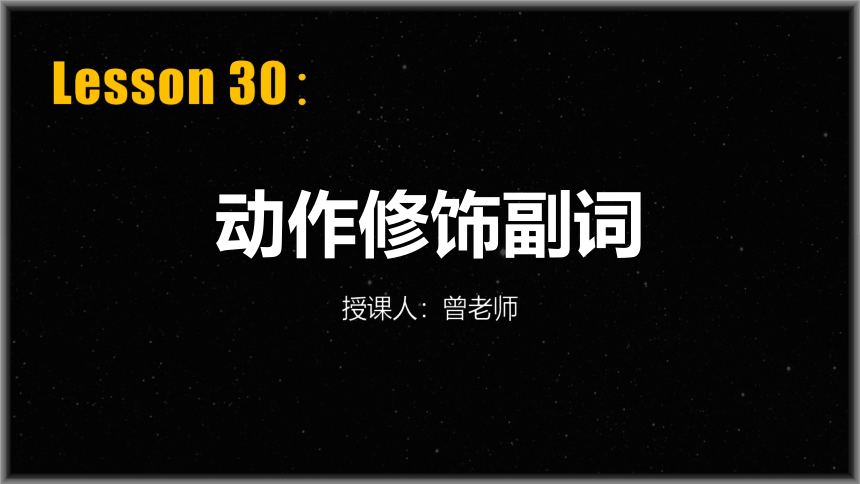
|
|
| 格式 | ppt | ||
| 文件大小 | 1.7MB | ||
| 资源类型 | 试卷 | ||
| 版本资源 | 通用版 | ||
| 科目 | 英语 | ||
| 更新时间 | 2022-04-11 06:56:11 | ||
图片预览

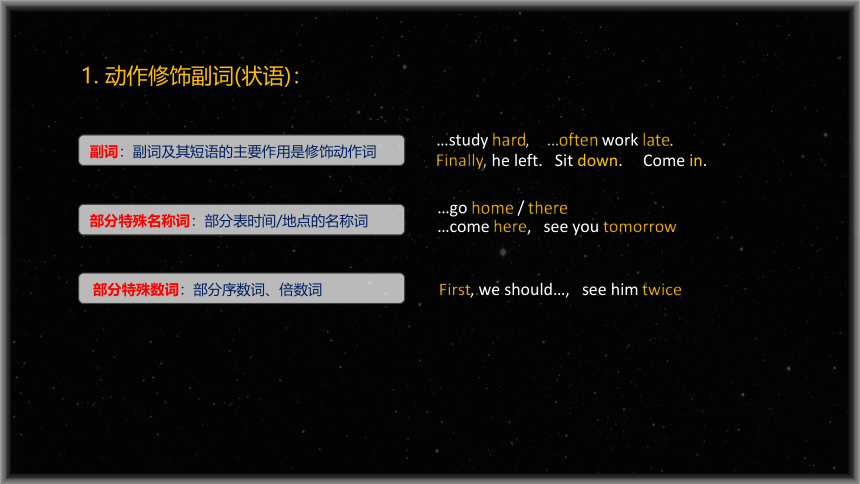
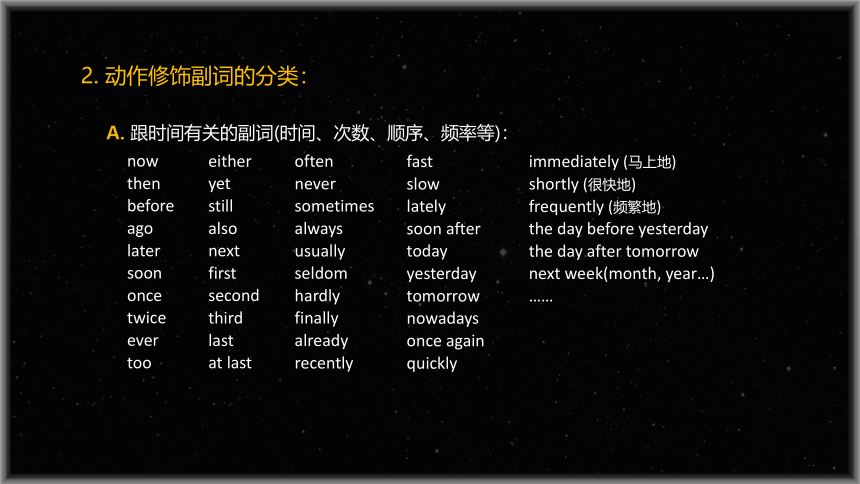
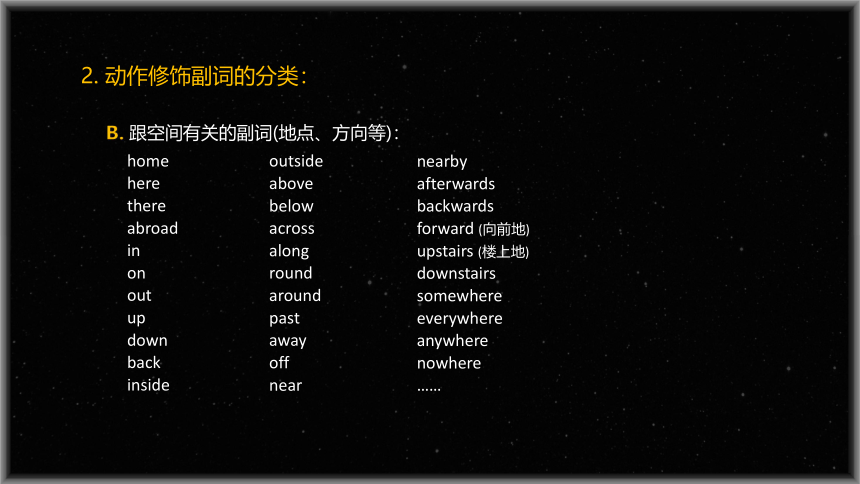
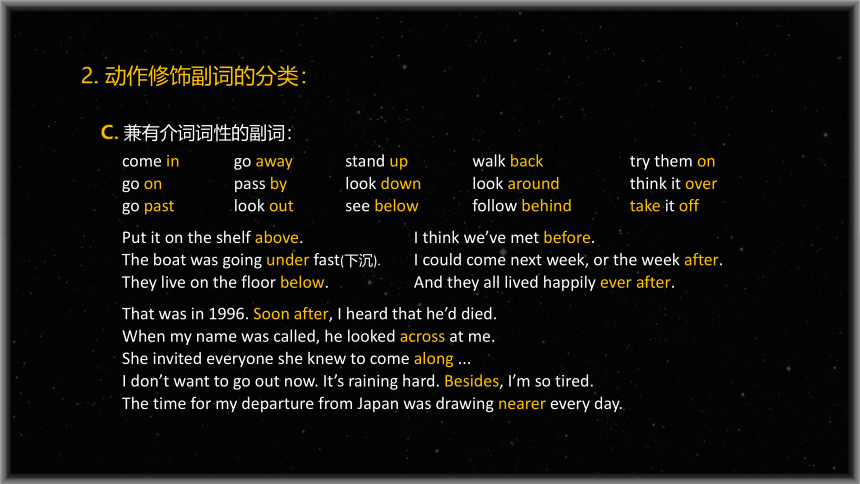
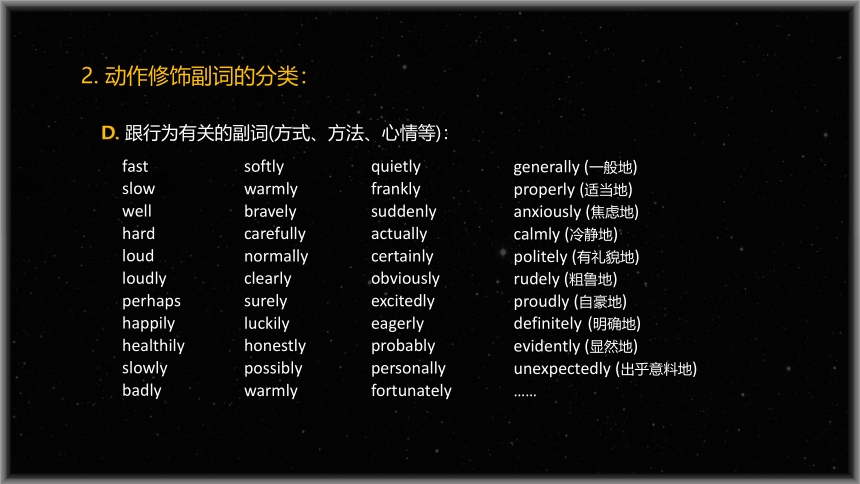
文档简介
(共13张PPT)
动作修饰副词
Lesson 30:
授课人:曾老师
副词:副词及其短语的主要作用是修饰动作词
部分特殊数词:部分序数词、倍数词
部分特殊名称词:部分表时间/地点的名称词
…go home / there
…come here, see you tomorrow
…study hard, …often work late.
Finally, he left. Sit down. Come in.
First, we should…, see him twice
1. 动作修饰副词(状语):
2. 动作修饰副词的分类:
A. 跟时间有关的副词(时间、次数、顺序、频率等):
now
then
before
ago
later
soon
once
twice
ever
too
either
yet
still
also
next
first
second
third
last
at last
often
never
sometimes
always
usually
seldom
hardly
finally
already
recently
fast
slow
lately
soon after
today
yesterday
tomorrow
nowadays
once again
quickly
immediately (马上地)
shortly (很快地)
frequently (频繁地)
the day before yesterday
the day after tomorrow
next week(month, year…)
……
2. 动作修饰副词的分类:
B. 跟空间有关的副词(地点、方向等):
home
here
there
abroad
in
on
out
up
down
back
inside
outside
above
below
across
along
round
around
past
away
off
near
nearby
afterwards
backwards
forward (向前地)
upstairs (楼上地)
downstairs
somewhere
everywhere
anywhere
nowhere
……
2. 动作修饰副词的分类:
That was in 1996. Soon after, I heard that he’d died.
When my name was called, he looked across at me.
She invited everyone she knew to come along ...
I don’t want to go out now. It’s raining hard. Besides, I’m so tired.
The time for my departure from Japan was drawing nearer every day.
Put it on the shelf above.
The boat was going under fast(下沉).
They live on the floor below.
I think we’ve met before.
I could come next week, or the week after.
And they all lived happily ever after.
C. 兼有介词词性的副词:
come in
go on
go past
go away
pass by
look out
try them on
think it over
take it off
walk back
look around
follow behind
stand up
look down
see below
D. 跟行为有关的副词(方式、方法、心情等):
2. 动作修饰副词的分类:
fast
slow
well
hard
loud
loudly
perhaps
happily
healthily
slowly
badly
softly
warmly
bravely
carefully
normally
clearly
surely
luckily
honestly
possibly
warmly
generally (一般地)
properly (适当地)
anxiously (焦虑地)
calmly (冷静地)
politely (有礼貌地)
rudely (粗鲁地)
proudly (自豪地)
definitely (明确地)
evidently (显然地)
unexpectedly (出乎意料地)
……
quietly
frankly
suddenly
actually
certainly
obviously
excitedly
eagerly
probably
personally
fortunately
3. 学会使用动作修饰副词:
他们有望获得第一名:
大多数表述:They can win the first.
由于表述方式的不同,大部分学生不太会使用副词。比如:
我对我所做的事真的很抱歉:
大多数表述:I am very sorry for what I did.
她病得不轻:
大多数表述:She was very ill.
她这个答案明显错了:
大多数表述:Her answer is wrong.
更好表述:They can hopefully win the first.
更好表述:I am extremely sorry for what I did.
更好表述:She was terribly (badly) ill.
更好表述:Her answer is obviously wrong.
3. 学会使用动作修饰副词:
动车服务很好,它们一直很准时:
大多数表述:The bullet train service is good. They are on time.
少数家长认为孩子们无法照料好他们自己:
大多数表述:A few parents think their kids can’t take good care of themselves.
去那儿一般要花20分钟:
大多数表述: It takes 20 minutes to get there.
更好的表述:It normally (usually) takes 20 minutes to get there.
更好的表述:They bullet train service is good. They are always on time.
更好的表述:A few parents may even think their kids can’t take good care of themselves.
4. 动作修饰副词的位置:
B. 系动词+表述语结构下(不包括系动动词),一般放在系动词之后。比如:
She is often late for school.
I am already finished.
His brother are now in the hospital.
A. 频度副词一般放在完整动作词(包括系动动词)的前面,动作辅助词之后。比如:
I often help him these days.
I still remember the day when I first came to this school.
You mustn’t always help me.
Those new students sometimes go to dance.
These leaves never get yellow.
4. 动作修饰副词的位置:
C. 其它多数副词一般放在完整动作词的后面。比如:
Go home/there/out/away, come in/here, …
They want to play football this afternoon.
He works nights and sleeps days.
They study very hard at science.
Weifang passed the exam luckily.
D. 如果需要强调,部分副词可以放在句首(关键词优先原则)。比如:
These days I often go to visit him.
Luckily, Weifang passed the exam.
Usually, they go shopping on weekends.
Finally, I would like to thank you all for coming here today.
4. 动作修饰副词的位置:
E. 有些副词只能放在句首或句中,有些只能放在句尾。比如:
No one has ever done so before.
She won’t ever speak of it any more.
I hardly ever see him nowadays.
I’m still hungry.
Does she still work in the company
I am also a doctor.
I can also do that.
I also want to play that game.
I am a doctor, too.
I can do that, too.
I want to play that game too.
But Madonna is more than just a pop star.
5. 肯定副词与否定副词:
有些副词只表示肯定(also, too,…),有些则表示否定(either, ever…)。
比如:
I am a doctor, too.
I can do that, too.
I want to play that game too.
I am not a doctor, either.
I can’t do that, either.
I don’t want to play that game, either.
常用副词:
动作修饰副词
Lesson 30:
授课人:曾老师
副词:副词及其短语的主要作用是修饰动作词
部分特殊数词:部分序数词、倍数词
部分特殊名称词:部分表时间/地点的名称词
…go home / there
…come here, see you tomorrow
…study hard, …often work late.
Finally, he left. Sit down. Come in.
First, we should…, see him twice
1. 动作修饰副词(状语):
2. 动作修饰副词的分类:
A. 跟时间有关的副词(时间、次数、顺序、频率等):
now
then
before
ago
later
soon
once
twice
ever
too
either
yet
still
also
next
first
second
third
last
at last
often
never
sometimes
always
usually
seldom
hardly
finally
already
recently
fast
slow
lately
soon after
today
yesterday
tomorrow
nowadays
once again
quickly
immediately (马上地)
shortly (很快地)
frequently (频繁地)
the day before yesterday
the day after tomorrow
next week(month, year…)
……
2. 动作修饰副词的分类:
B. 跟空间有关的副词(地点、方向等):
home
here
there
abroad
in
on
out
up
down
back
inside
outside
above
below
across
along
round
around
past
away
off
near
nearby
afterwards
backwards
forward (向前地)
upstairs (楼上地)
downstairs
somewhere
everywhere
anywhere
nowhere
……
2. 动作修饰副词的分类:
That was in 1996. Soon after, I heard that he’d died.
When my name was called, he looked across at me.
She invited everyone she knew to come along ...
I don’t want to go out now. It’s raining hard. Besides, I’m so tired.
The time for my departure from Japan was drawing nearer every day.
Put it on the shelf above.
The boat was going under fast(下沉).
They live on the floor below.
I think we’ve met before.
I could come next week, or the week after.
And they all lived happily ever after.
C. 兼有介词词性的副词:
come in
go on
go past
go away
pass by
look out
try them on
think it over
take it off
walk back
look around
follow behind
stand up
look down
see below
D. 跟行为有关的副词(方式、方法、心情等):
2. 动作修饰副词的分类:
fast
slow
well
hard
loud
loudly
perhaps
happily
healthily
slowly
badly
softly
warmly
bravely
carefully
normally
clearly
surely
luckily
honestly
possibly
warmly
generally (一般地)
properly (适当地)
anxiously (焦虑地)
calmly (冷静地)
politely (有礼貌地)
rudely (粗鲁地)
proudly (自豪地)
definitely (明确地)
evidently (显然地)
unexpectedly (出乎意料地)
……
quietly
frankly
suddenly
actually
certainly
obviously
excitedly
eagerly
probably
personally
fortunately
3. 学会使用动作修饰副词:
他们有望获得第一名:
大多数表述:They can win the first.
由于表述方式的不同,大部分学生不太会使用副词。比如:
我对我所做的事真的很抱歉:
大多数表述:I am very sorry for what I did.
她病得不轻:
大多数表述:She was very ill.
她这个答案明显错了:
大多数表述:Her answer is wrong.
更好表述:They can hopefully win the first.
更好表述:I am extremely sorry for what I did.
更好表述:She was terribly (badly) ill.
更好表述:Her answer is obviously wrong.
3. 学会使用动作修饰副词:
动车服务很好,它们一直很准时:
大多数表述:The bullet train service is good. They are on time.
少数家长认为孩子们无法照料好他们自己:
大多数表述:A few parents think their kids can’t take good care of themselves.
去那儿一般要花20分钟:
大多数表述: It takes 20 minutes to get there.
更好的表述:It normally (usually) takes 20 minutes to get there.
更好的表述:They bullet train service is good. They are always on time.
更好的表述:A few parents may even think their kids can’t take good care of themselves.
4. 动作修饰副词的位置:
B. 系动词+表述语结构下(不包括系动动词),一般放在系动词之后。比如:
She is often late for school.
I am already finished.
His brother are now in the hospital.
A. 频度副词一般放在完整动作词(包括系动动词)的前面,动作辅助词之后。比如:
I often help him these days.
I still remember the day when I first came to this school.
You mustn’t always help me.
Those new students sometimes go to dance.
These leaves never get yellow.
4. 动作修饰副词的位置:
C. 其它多数副词一般放在完整动作词的后面。比如:
Go home/there/out/away, come in/here, …
They want to play football this afternoon.
He works nights and sleeps days.
They study very hard at science.
Weifang passed the exam luckily.
D. 如果需要强调,部分副词可以放在句首(关键词优先原则)。比如:
These days I often go to visit him.
Luckily, Weifang passed the exam.
Usually, they go shopping on weekends.
Finally, I would like to thank you all for coming here today.
4. 动作修饰副词的位置:
E. 有些副词只能放在句首或句中,有些只能放在句尾。比如:
No one has ever done so before.
She won’t ever speak of it any more.
I hardly ever see him nowadays.
I’m still hungry.
Does she still work in the company
I am also a doctor.
I can also do that.
I also want to play that game.
I am a doctor, too.
I can do that, too.
I want to play that game too.
But Madonna is more than just a pop star.
5. 肯定副词与否定副词:
有些副词只表示肯定(also, too,…),有些则表示否定(either, ever…)。
比如:
I am a doctor, too.
I can do that, too.
I want to play that game too.
I am not a doctor, either.
I can’t do that, either.
I don’t want to play that game, either.
常用副词:
同课章节目录
- 词法
- 名词
- 动词和动词短语
- 动词语态
- 动词时态
- 助动词和情态动词
- 非谓语动词
- 冠词
- 代词
- 数词和量词
- 形容词副词及其比较等级
- 介词和介词短语
- 连词和感叹词
- 构词法
- 相似、相近词比较
- 句法
- 陈述句
- 一般疑问句和否定疑问句
- 特殊疑问句及选择疑问句
- 反意疑问句
- 存在句(There be句型)
- 宾语从句
- 定语从句
- 状语从句
- 主谓一致问题
- 简单句
- 并列句
- 复合句
- 主谓一致
- 主、表语从句
- 名词性从句
- 直接引语和间接引语
- 虚拟语气
- 感叹句
- 强调句
- 倒装句
- 祈使句
- 句子的成分
- 句子的分类
- 题型专区
- 单项选择部分
- 易错题
- 完形填空
- 阅读理解
- 词汇练习
- 听说训练
- 句型转换
- 补全对话
- 短文改错
- 翻译
- 书面表达
- 任务型阅读
- 语法填空
- 其他资料
